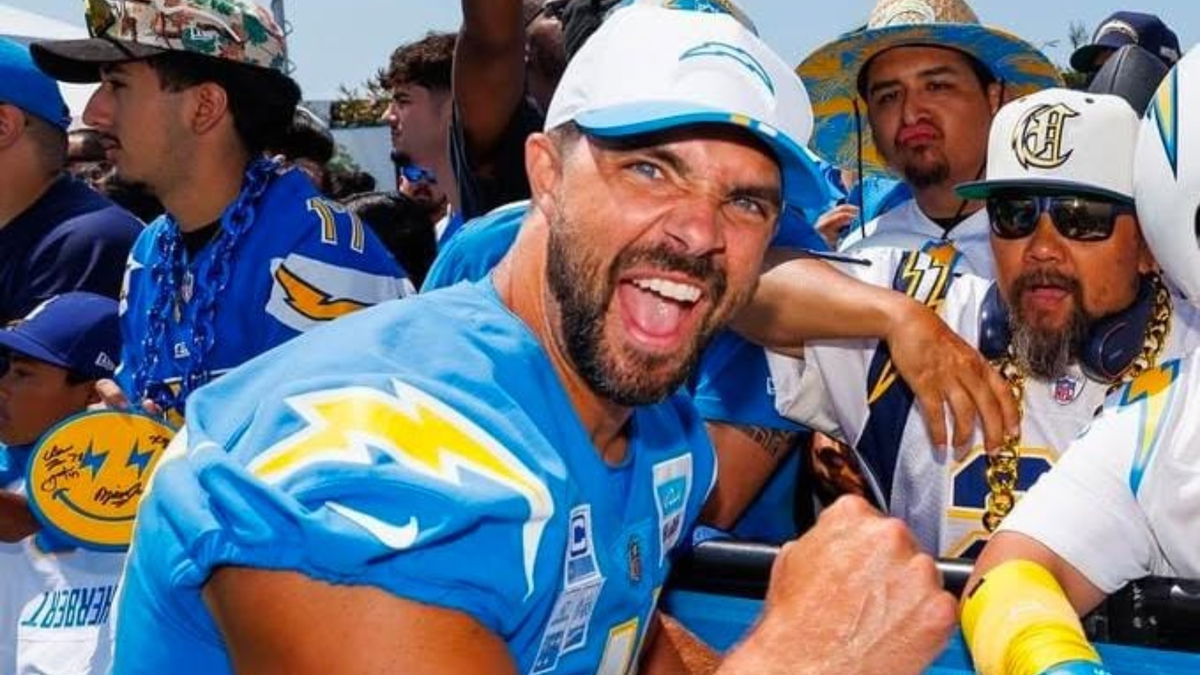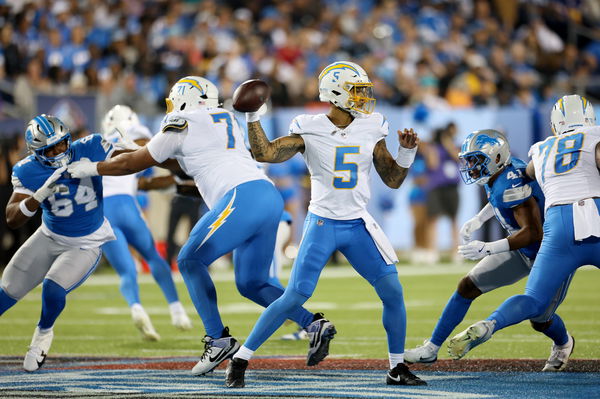
Imago
Image credits: via IG @jharris_47

Imago
Image credits: via IG @jharris_47

Imago
Image credits: via IG @jharris_47

Imago
Image credits: via IG @jharris_47
At the Chargers‘ first voluntary minicamp, Josh Harris looked like a man on a mission. The veteran long snapper wasn’t joking around or babysitting rookies. He was the soothing voice in the locker room, the guy who had seen the grind himself for over a decade. And as he enters the 4th season with the Chargers, Harris made one thing clear as day: Every edge matters in this league. You don’t leave anything to chance, not even those small rituals that keep you retooling in the middle of the game. Fast-forward to Tuesday, and that ‘small ritual’ just became a whole lot more complex.
Watch What’s Trending Now!
During a press conference following the NFL’s recent policy banning teams from offering smelling salts on game days, Josh Harris was no stranger to keeping his concerns vague. He acknowledged there had been confusion and frustration. “Selfishly, you know, I do use those during a game just to kind of get you going,” Harris said on the press conference held on August 6.
“But I haven’t seen exactly why they were, you know, taken away. I’m sure we’ll know more in coming up days. But, hey, if that’s an issue that guys want to raise. I mean, I’m sure we can go through the appropriate channels .” Josh Harris clearly wasn’t expecting this. The league clarified that the ban applies specifically to team-supplied capsules, saying the product can mask concussion symptoms. Hence, organizations will no longer stock or distribute them.

Imago
NFL, American Football Herren, USA Pro Football Hall of Fame Game-Los Angeles Chargers at Detroit Lions Jul 31, 2025 Canton, Ohio, USA Los Angeles Chargers quarterback Trey Lance 5 throws in the second quarter against the Detroit Lions at Tom Benson Hall of Fame Stadium. Canton Tom Benson Hall of Fame Stadium Ohio USA, EDITORIAL USE ONLY PUBLICATIONxINxGERxSUIxAUTxONLY Copyright: xScottxGalvinx 20250731_lbm_bg7_067
When asked whether he’d find a substitute, Josh Harris joked: “Coffee. Yeah, whatever it takes, man. We’re all doomed if they take away caffeine.” His comments strike a chord with low-key tension percolating just below the surface of locker rooms across the league. And not merely for those players who fly under the radar screen. George Kittle, never shy for a microphone, joked about having “contemplated retirement” because of the ban. One sarcastic exaggeration that still betokened a sincere shift for competitors who were used to utilizing smelling salts as part of their mental restart.
The move caught many by surprise, but it was not an impulsive purge. It is the culmination of decades of safety rhetoric driven by progress in sports science and increased scrutiny around neuro health. From a systematic review on ResearchGate titled “Ammonia inhalation for enhancing physical performance and exercise tolerance in physically active individuals and athletes,” smelling salts increase heart rate and alertness. But there is no credible evidence to show that it enhances strength, power, or neuromuscular performance in high-impact sports. The study also cautioned against abuse, specifically where players use ammonia to force through symptoms they would otherwise encounter. Such as dizziness or concussion following a significant blow.
The NFL has long weighed the desire to preserve player rituals in place alongside the requirement to safeguard long-term player health. But for Harris and many of his peers, the feeling now is simple: They weren’t prepared. ”I just kind of heard through the grape vine today that they had taken it away. But yeah, we’ll see kind of how that goes,” Josh Harris admitted.
NFL substance ban shook entire league, besides Josh Harris
The outcry stemmed from a memo released this week by the league, citing a 2024 FDA warning against the use of ammonia inhalants for sale to promote alertness or increase energy. The league feared that ammonia capsules would cover up symptoms of concussions and include cardiovascular concerns. Especially when repeated throughout stressful snaps.
The memo reads: “In 2024, the FDA issued a warning to companies that produce commercially available ammonia inhalants (AIs), as well as to consumers about the purchase and use of AIs, regarding the lack of evidence supporting the safety or efficacy of AIs marketed for improving mental alertness or boosting energy. The FDA noted potential negative effects from AI use. AIs also have the potential to mask certain neurologic signs and symptoms, including some potential signs of concussion. As a result, the NFL Head, Neck, and Spine Committee recommended prohibiting the use of AIs for any purpose during play in the NFL.”
The NFL framed the step as one of its larger efforts to clear “unverified stimulants” out of team facilities. League leaders also noted that the action was taken in consultation with medical advisors and performance health experts. And with the preseason now underway, more players are sure to begin venting their own outrage. If the league hoped this ban would fly under the radar, Josh Harris’s comment ensured it to be a headline. And as teams begin to make changes and players begin to weigh their options, one thing is certain: Smelling salts might be minor, but the ripple effect from their ban is about to be anything but small.





